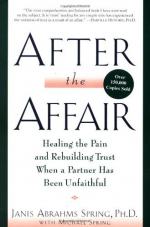
|
| Name: _________________________ | Period: ___________________ |
This test consists of 15 multiple choice questions and 5 short answer questions.
Multiple Choice Questions
1. How do most unfaithful partners describe sex with their lover?
(a) Awkward or unsatisfying.
(b) Fulfilling or passionate.
(c) Routine or bland.
(d) Dangerous or bold.
2. Developing realistic expectations of sex involves examining assumptions regarding which emotion?
(a) Passion.
(b) Love.
(c) Lust.
(d) Desire.
3. Which is an assumption about sexual intimacy by many couples?
(a) It will decrease during the marriage.
(b) It could be regained in a relationship.
(c) It should come easily and naturally.
(d) It would be more exciting with a lover.
4. Analyzing childhood experiences can lead to which result in a marriage?
(a) A deep-rooted fear of losing a child.
(b) A partner having an affair.
(c) A better understanding of relationship problems.
(d) A comparison to the happiness of their parents.
5. Forgiveness should not be offered in which way?
(a) Openly and honestly.
(b) Tentatively and earnestly.
(c) Passionately and fully.
(d) Freely and unconditionally.
6. A hurt partner may avoid demanding change if they feel it will lead to which situation?
(a) Confrontation.
(b) Rationalization.
(c) Divorce.
(d) Abuse.
7. According to Chapter 6, how can trust be restored in a person?
(a) Cutting off all communication to the lover.
(b) Addressing the root causes of the affair.
(c) Changing personal behavior to display trustworthiness.
(d) Recommitting fully to the relationship.
8. When does the hurt partner mistakenly believe that the unfaithful partner must accomplish their personal change?
(a) After the children know.
(b) Before the marriage is reconciled.
(c) After the affair ends.
(d) Before the hurt partner changes.
9. Why do some partners mistakenly believe that verbal abuse must be accepted?
(a) It is part of their personality.
(b) It is justified after the affair.
(c) It is deserved by the unfaithful partner.
(d) It is how their parents treated them.
10. How many essential childhood experiences are identified by the text?
(a) Eleven.
(b) Nine.
(c) Seven.
(d) Five.
11. Intimate listening can be described as which skill?
(a) Understanding what your partner is experiencing.
(b) Accepting what your partner is explaining.
(c) Hearing what your partner is trying to tell you.
(d) Agreeing with what your partner is saying.
12. Forgiveness can be described in which way?
(a) As a process.
(b) As an outcome.
(c) As a reality.
(d) As a need.
13. An accident or illness are examples of which root cause of an affair?
(a) Childhood experiences.
(b) Unfair circumstances.
(c) Critical life events.
(d) Fear of losing a partner.
14. A listener should not engage in which action?
(a) Remaining silent.
(b) Asking for clarification.
(c) Arguing.
(d) Ignoring.
15. A graph is provided for couples to chart behaviors that can be preformed in which timeframe?
(a) Exponentially.
(b) Eventually.
(c) Step-by-step.
(d) Immediately.
Short Answer Questions
1. Children who did not express themselves growing up were often treated in which way by their parents?
2. What is the process of assaulting a partner with verbal abuse?
3. If the unfaithful partner is not interested in sex, the hurt partner may assume which possibility?
4. How should behaviors that detract from trust be addressed?
5. The process of talking could be different for each partner based on which reality?
|
This section contains 514 words (approx. 2 pages at 300 words per page) |

|




